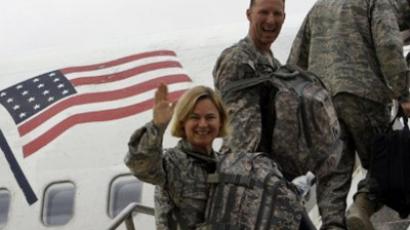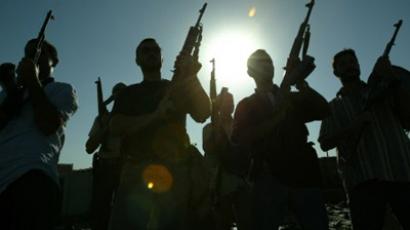Worst violence in months hits Baghdad
Reports are emerging of a series of blasts in Baghdad which are believed to have killed at least 72 people in an apparently coordinated attack. Nearly 200 people were wounded, according to a spokesman for the Iraqi Health Ministry.
Iraqi officials said at least 12 bombs went off early on Thursday morning in nine neighborhoods around the city. The violence ranged from sticky bombs attached to cars to roadside bombs and vehicles packed with explosives. Most of the carnage occurred in Shiite neighborhoods, although some Sunni areas were also attacked. There was no immediate claim of responsibility. The violence is the worst to hit Baghdad in months. It comes in the wake of a political crisis between Iraq's Sunni and Shiite factions, which erupted this weekend on the heels of the US troop withdrawal.The government of Prime Minister Nouri al-Maliki has accused the Sunni vice president, Tariq al-Hashemi, of running a hit squad targeting government officials. Al-Maliki is also pushing for a vote of no-confidence against another Sunni politician, the deputy Prime Minister Saleh al-Mutlaq.Many Sunnis fear that this is part of a wider campaign to go after Sunni political figures in general and shore up Shiite control across the country.However, according to the Associated Press, the coordinated nature of today’s assault suggests a planning capability only available to al-Qaeda in Iraq. The Sunni extremist group often targets Shiites who they believe are not true Muslims, and it was mostly Shiite neighborhoods which were targeted. Earlier, American military officials said they were worried about a resurgence of al-Qaeda after the US military leaves the country. If that happens, it could lead Shiite militants to fight back and attack Sunni targets, thus sending Iraq back to the sectarian violence it experienced just a few years ago.However, Phyllis Bennis, Director of the Institute for Policy Studies, told RT it is rather ironic the American officials now claim the US troop withdrawal could lead to further sectarian violence, as it was their policies that created the problem in the first place.“In the original invasion and occupation of Iraq, the US brought into being a level of sectarian discord and ultimately sectarian fighting that had not been in Iraq prior to the US invasion.”“The US very consciously created a governing structure with its occupation of Iraq that was based on sectarian divide; it was based on sectarian identity that had not been primary in Iraq." She was also quick to dismiss any calls for a return of US troops.“The worst thing that could happen would be a return to US occupation; that’s what led to this level of sectarian divide in the first place.I think what is needed is a full withdrawal of US troops, not only from Iraqi territory, but from what they like to call ‘over the horizon.’ We now have thousands of US troops poised at new US bases in Kuwait, on ships, on the coast, and ready to move back in.It’s a very threatening environment, as well threatening to Iraq’s neighbors, most notably Iran.This is not a stabilizing force, it never has been. I don’t accept the premise that the US occupation force has provided stability.If we look at 2006/2007, at the height of the US occupation, those were the two years or so of the worst kind of sectarian warfare that Iraq had ever seen.”
And Karl Sharro, a Middle East blogger, told RT Thursday’s violence is less connected with sectarianism than a lack of vision on the part of the Obama administration. “The fundamental problems Iraq will face in the immediate and near future are primarily due to the failure of American policy – particularly the Obama administration – in taking responsibility for the intervention and occupation of Iraq by the Bush administration.” Sharro further accused the US of pursuing "lowest common denominator politics in order to arrive at a semblance of security and political stability [in order to say] the job has been done and now we need to leave.” He continued that the US withdrawal had intensified the power struggle within the country."With America out of the equation militarily, there are still other foreign hands involved in the country. I am not talking about any particular conspiracies, but rather the jostling for power. If you examine the details of the current crisis, it was initiated by PM al-Maliki’s attempt to grab more power ahead of the American withdrawal.”In light of Thursday’s deadly attack, Sharro envisioned "either a short bout of violence” followed by a political solution, “or a complete breakdown … in which those who don’t have the political power and the authority left to them by the previous American arrangement, will use anything at their disposal – including car bombs.”However, Sharro denied the common narrative that this is purely a matter of sectarian conflict. “It’s not necessarily a boiling point of sectarian violence; it’s a cynical attempt by people who play the sectarian card for political gain to try and jostle for space,” he said. However, “the Iraqi people can still play their part … to stop this cynical conflict for power and keep Iraq from descending further into chaos."














